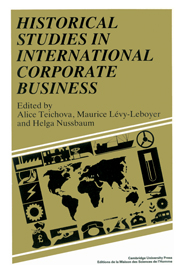Book contents
- Frontmatter
- Contents
- Preface
- 1 Introduction: multinational enterprise
- 2 History, the social sciences and economic ‘theory’, with special reference to multinational enterprise
- 3 The changing form of multinational enterprise expansion in the twentieth century
- 4 Electrical research, standardisation and the beginnings of the corporate economy
- 5 The nature of multinationals, 1870–1939
- 6 International price maintenance: control of commodity trade in the 1920s
- 7 Financial operations of US transnational corporations: development after the Second World War and recent tendencies
- 8 Multinational enterprise – financing, trade, diplomacy: the Swedish case
- 9 Foreign penetration of German enterprises after the First World War: the problem of Überfremdung
- 10 International industrial cartels, the state and politics: Great Britain between the wars
- 11 Vickers and Schneider: a comparison of new British and French multinational strategies 1916–26
- 12 J. & P. Coats Ltd in Poland
- 13 Multinationals and the French electrical industry, 1889–1940
- 14 The Japanese cotton spinners' direct investments into China before the Second World War
- 15 Mitsui Bussan during the 1920s
- 16 Japanese business in the United States before the Second World War: the case of Mitsui and Mitsubishi
- 17 The state and private enterprise in the United States–Latin American oil policy
- 18 Transnational corporations and the denationalization of the Latin American cigarette industry
- 19 Summary: Reflections on the papers and the debate on multinational enterprise: international finance, markets and governments in the twentieth century
- Index of names
- Index of firms
- Index of subjects
4 - Electrical research, standardisation and the beginnings of the corporate economy
Published online by Cambridge University Press: 04 August 2010
- Frontmatter
- Contents
- Preface
- 1 Introduction: multinational enterprise
- 2 History, the social sciences and economic ‘theory’, with special reference to multinational enterprise
- 3 The changing form of multinational enterprise expansion in the twentieth century
- 4 Electrical research, standardisation and the beginnings of the corporate economy
- 5 The nature of multinationals, 1870–1939
- 6 International price maintenance: control of commodity trade in the 1920s
- 7 Financial operations of US transnational corporations: development after the Second World War and recent tendencies
- 8 Multinational enterprise – financing, trade, diplomacy: the Swedish case
- 9 Foreign penetration of German enterprises after the First World War: the problem of Überfremdung
- 10 International industrial cartels, the state and politics: Great Britain between the wars
- 11 Vickers and Schneider: a comparison of new British and French multinational strategies 1916–26
- 12 J. & P. Coats Ltd in Poland
- 13 Multinationals and the French electrical industry, 1889–1940
- 14 The Japanese cotton spinners' direct investments into China before the Second World War
- 15 Mitsui Bussan during the 1920s
- 16 Japanese business in the United States before the Second World War: the case of Mitsui and Mitsubishi
- 17 The state and private enterprise in the United States–Latin American oil policy
- 18 Transnational corporations and the denationalization of the Latin American cigarette industry
- 19 Summary: Reflections on the papers and the debate on multinational enterprise: international finance, markets and governments in the twentieth century
- Index of names
- Index of firms
- Index of subjects
Summary
While there is little disagreement among students of the history of multinational enterprise as to what Alfred Chandler seeks to argue in his chapter in Multinational enterprise in historical perspective, there are nevertheless a few gaps to be filled in this area. Chandler summarises his argument by stressing that ‘an understanding of technological and organizational differences and changes within operating units is essential to an explanation of the beginnings and continued growth of the industrial multinational enterprise’. Since about 1880 a salient feature of this development was, as its factor and product, mass production methods linked with standardisation. Here a major impetus came from electrical engineering which required internationally acceptable electrical units. A satisfactory solution of this problem was a precondition before electrification's economic and social potential could be realised.
The aim of what follows is to draw attention to this rather neglected aspect of the history of scientific and industrial relations, which is, however, relevant to the understanding of the origins and development of the corporate economy in its national and multinational context.
The late nineteenth-century ‘climacteric’
The term ‘multinational corporation’ itself, as noted by D. K. Fieldhouse, is of recent date (1960). However in his influential book The Unbound Prometheus (1969) David Landes does not appear to make use of it.
- Type
- Chapter
- Information
- Historical Studies in International Corporate Business , pp. 29 - 42Publisher: Cambridge University PressPrint publication year: 1989

